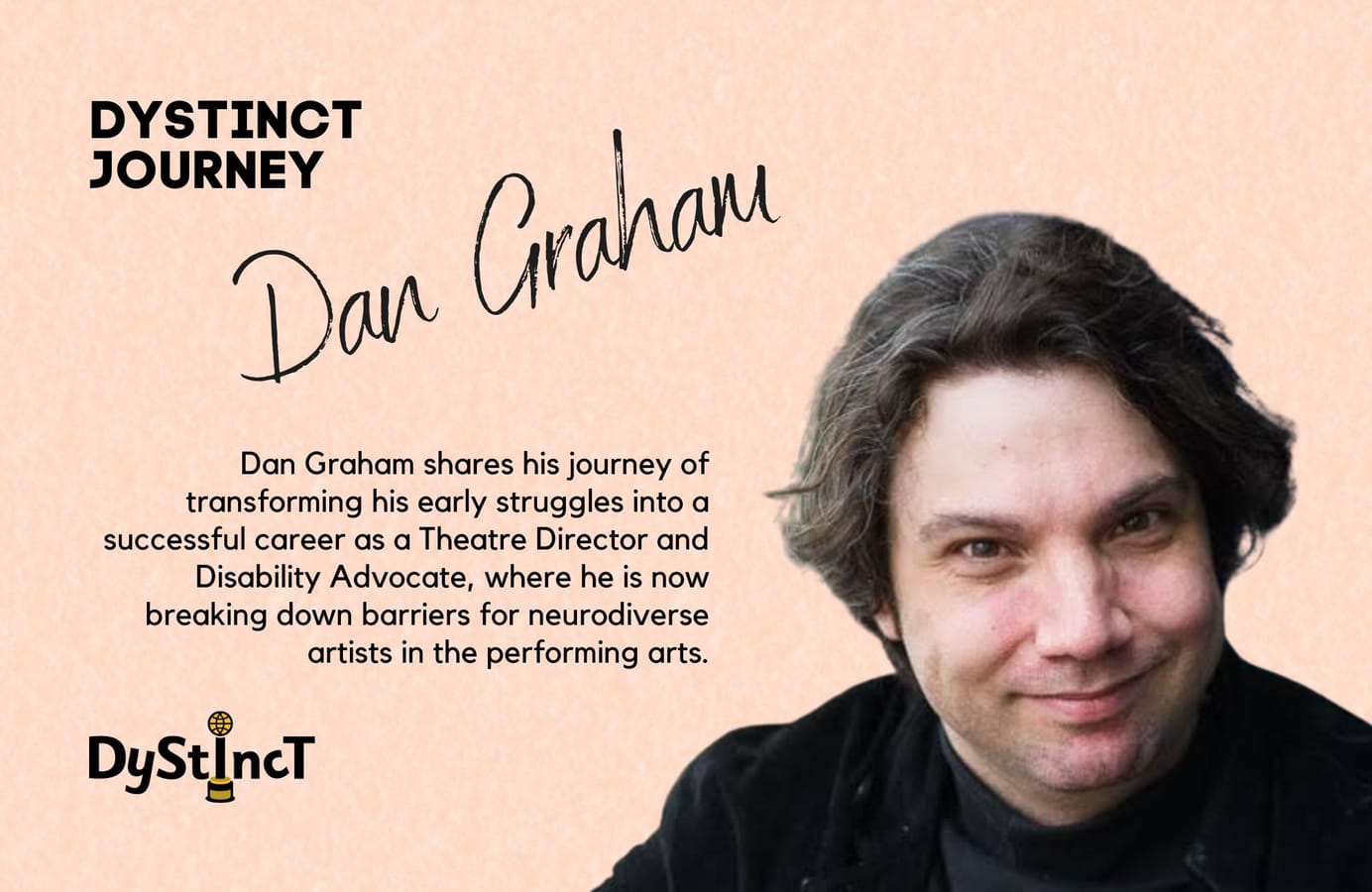
Issue 23: Dystinct Journey of Dan Graham
Dan Graham shares his journey of transforming his early struggles into a successful career as a Theatre Director and Disability Advocate, where he is now breaking down barriers for neurodiverse artists in the performing arts.
Dan's Story
Dan's Story
Dan's journey began with a fight for survival. Born without breathing for the first ten minutes of his life, Dan spent his earliest days in a humidity crib, reliant on machines to breathe. This problematic start was just the beginning of a series of challenges that would shape his life. Diagnosed with mild cerebral palsy, Dan didn't walk or talk until he was five years old. "I had to go through speech therapy, occupational therapy - the whole gamut," he recalls. While his mild cerebral palsy does affect his coordination and ability to write for long periods, Dan has always resisted labels. "If I had to choose one, I'd call myself neurodivergent," he says, preferring this term over any other.
I hate labels full stop. I would call myself neurodivergent if there had to be a tag.
Dan's primary school years were marked by significant challenges, with his close relationship with his mother and grandmother his only saving grace. His mother, the assistant principal at his primary school, understood the difficulties he faced and took an active role in his education. "I always say my education happened at home. Mum and Gran took me to all my therapy sessions. I didn't like it at times, but obviously my mum wanted to be my mum. She didn't want to be the teacher," Dan reflects. Despite his mum's support, Dan often felt misunderstood at school, where he was seen as "the stupid person" or "the weird person" and was frequently bullied.
Art became Dan's "salvation" during those difficult years, and his introduction to theatre came early, largely thanks to his mother and grandmother. "Gran took me to an old-school musical called Sugar Babies when I was around five," he recalls. "At the end of Act One, the chorus boys threw bags of lollies into the audience, and I grabbed one. From that moment on, I was totally sucked into theatre." His storytelling, however, began even earlier at home, where he had an obsession with stuffed toy monkeys. "I had about 15 of them, and I'd create whole plays with them -they were my first actors," he shares. His mother, with her background in music and theatre, also played a key role. "She directed plays, ran choirs, and introduced me to the arts. She's the one who truly inspired my love for theatre."
By the time Dan reached year four, it became clear that he was still struggling despite his mum's help. After a series of evaluations, he was diagnosed with dyslexia, adding another layer to the complexities of his education. His mother arranged for him to attend a program at Macquarie University, where he received intensive literacy support. "They taught me in less than a year how to read, which comes in pretty handy when you're a director," Dan recalls with a smile. One moment from that time still sticks with him - the end-of-year show. "I remember this vividly. It was The Gingerbread Man, and I was shattered. I wasn't cast as the Gingerbread Man, and after all these years, I probably hold that grudge still," he laughs. "The funny thing is, I was cast as the narrator because I was informed that I was the best reader."
My earliest memory of theatre was when I was about five and just starting to talk and my gran took me to an old-school musical called Sugar Babies
In year five, Dan's mother decided it was no longer healthy for him to attend the same school where she was the assistant principal, so he transferred to a new local primary school. However, the transition was far from smooth. "Those years were hell," Dan recalls. Like many neurodiverse individuals, he faced challenges with coordination and fine motor skills, making simple tasks feel monumental. "I remember asking my teacher if I could have help drawing a line, and he said, 'Yeah, no worries, just give me a second.' He came back with what felt like a thousand rulers - though it was probably 10 - and threw them on my desk, saying, 'Try and draw a line now, Dan,' and laughed. All the other kids laughed, too." Despite these humiliations and being bullied regularly, Dan was unexpectedly elected as a prefect at the end of the year. "Year six and year four voted for me because I was always protecting other kids who were bullied," Dan says. While the role didn't make him any more popular, it did solidify his sense of standing up for what was right.
I'm 45 now, and I’m not easily triggered. But I'm literally back in that moment now when I recall how he threw those rulers at me and laughed.
"I was bullied mercilessly," Dan reflects. He acknowledges that his interests were anything but typical for his age. "I followed Shakespeare and Stephen Sondheim for good measure, weird for a normal 12-year-old, which probably didn't help things at that primary school," he admits. For Book Week, while other kids dressed up as popular characters of the day, Dan decided to go as Hamlet, borrowing his mum's big, bowed blouse and a pair of her tights. "No wonder why I was bullied," he laughs.
This post is for paying subscribers only
SubscribeAlready have an account? Log in


